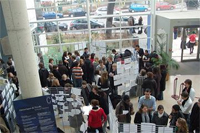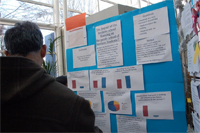Pedagogy with experimental economics
“A growing body of evidence demonstrates that behavioral science insights — research findings from fields such as behavioral economics and psychology about how people make decisions and act on them — can be used to design […] policies to better serve the […] people…”(Barack Obama, The White House, September 15 2015 [1]
The experimental method has recently become an indispensable, but still controversial tool in the manager’s toolbox. Our courses offer a view in the promises of the experimental approach in management and business, with a focus on decision making.
Our classes try to make a strong case of the need for experimentation based on game theory in management and business.
You can see some of the projects of our students on our Youtube Channel and also some pictures of their posters are available here, here and here.
We are also very proud of two of our former students, Camille Fromaget and Renaud Dor, who created the Projet Source and applied the experimental method to inquire around the world about necessity entrepreneurs.
In 2018, you can follow around the world the School Trotters, with Bérénice Stagnara and Adrien Zemour. They test around the world a game on empathy, helped by the SABE partners.



By using experiments in classroom, we try to provide students with a set of skills:
• Understand the principles of the experimental method and the need to use it in management.
• Develop a lab or a field experiment to study a behavioural issue.
• Understand and analyse behaviour and relation to contexts.
• Reason logically and work analytically on human interactions in business.
• Justify conclusions using economic and psychological arguments with appropriate rigour.
• Know how to, by taking into account a decision tree, apply the best game theoretical response.
• Know how to anticipate others' strategies and take them into account to form beliefs and construct strategies.
• Know how to interpret a game and suggest solutions to extend/improve the design on a field experiment
